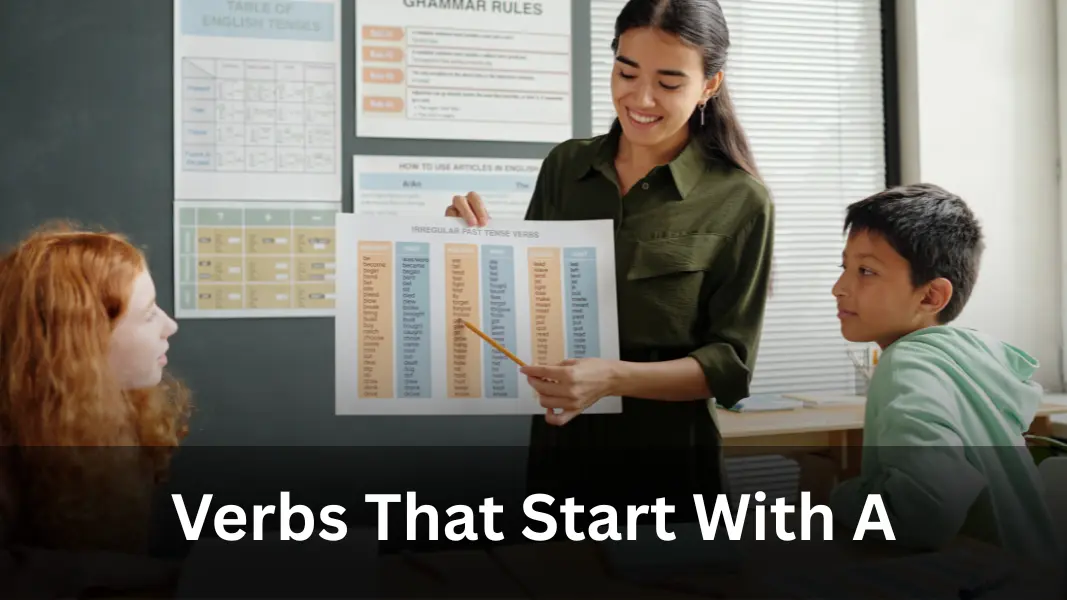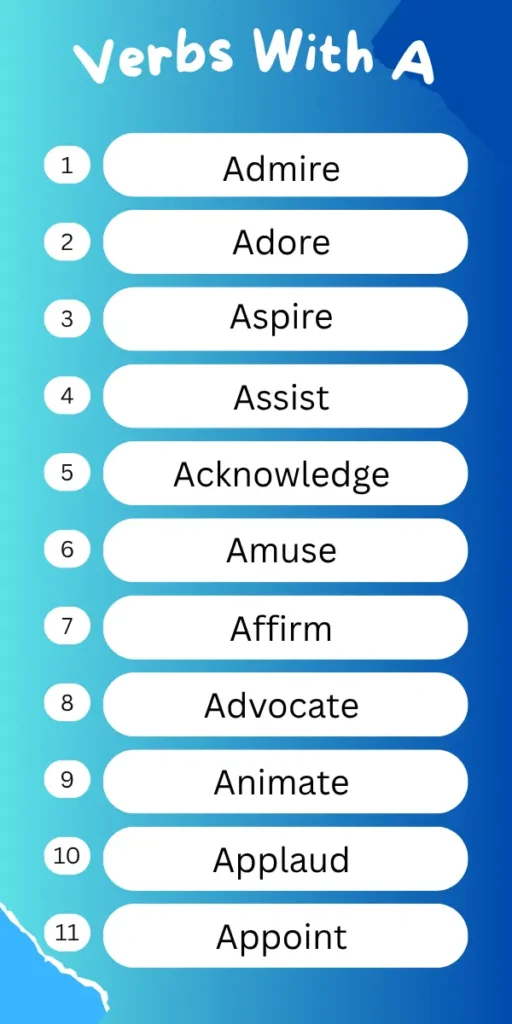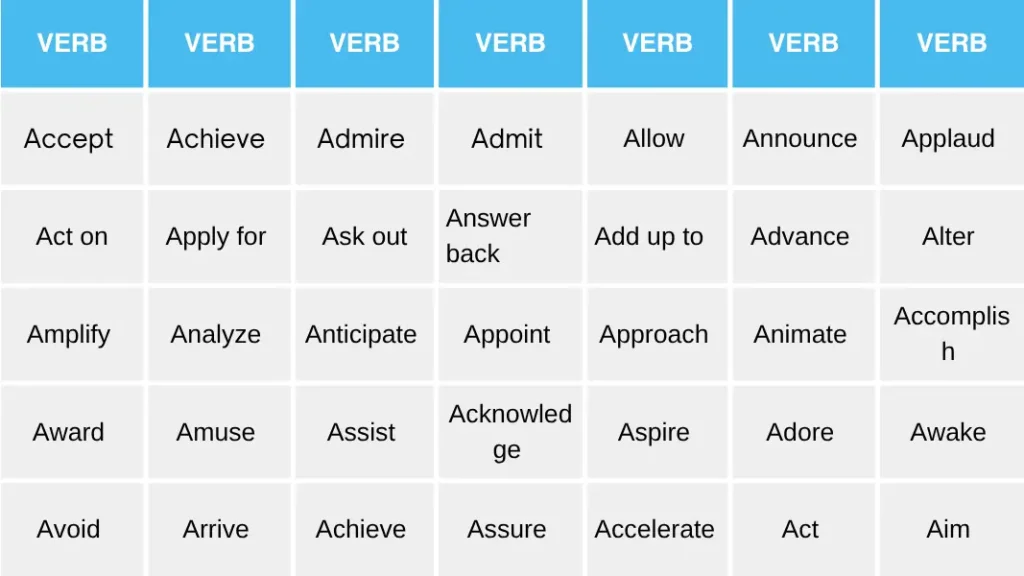Verbs That Start With A – Complete List With Meanings & Examples

From adding precision to sparking imagination, verbs that start with A hold a unique power in the English language. They can drive action, convey emotion, and transform ordinary writing into something vivid and engaging. Whether you’re a student expanding your vocabulary, a writer aiming for more expressive storytelling, or simply a language enthusiast, exploring “A” verbs is an excellent way to enrich your communication.
What Is a Verb?
A verb is a word that expresses an action, occurrence, or state of being. It’s one of the most important parts of speech because it tells us what the subject of a sentence is doing or experiencing. Verbs can show physical actions like run or build, mental actions like think or imagine, and states of being like to exist or belong.
List of Verbs That Start With A
Verbs beginning with the letter “A” are diverse and dynamic, ranging from action-packed words like accelerate and attack to more thoughtful ones such as admire and appreciate. Here’s a collection of useful “A” verbs to expand your vocabulary and add variety to your writing and speech.

Common Verbs Starting With A
- Accept – To agree to take or receive something.
Example: She gladly accepted the job offer. - Achieve – To successfully reach a goal through effort.
Example: He achieved his dream of becoming a pilot. - Add – To combine something with something else.
Example: Please add more sugar to the tea. - Admit – To confess or acknowledge something.
Example: She admitted her mistake during the meeting. - Agree – To share the same opinion as someone.
Example: We all agreed to start the project next week. - Allow – To permit or give permission.
Example: The teacher allowed the students to leave early. - Answer – To respond to a question or situation.
Example: Can you answer the phone, please? - Apply – To make a formal request or put into practice.
Example: He applied for a scholarship at the university. - Ask – To request information or an answer.
Example: May I ask you a question? - Arrange – To organize or put things in order.
Example: They arranged the chairs for the meeting. - Arrive – To reach a place.
Example: We arrived at the hotel before sunset. - Assist – To help or support.
Example: The guide assisted us during the trip. - Attach – To join or fasten something.
Example: Please attach the file to your email. - Avoid – To stay away from something.
Example: He avoided eating junk food for health reasons. - Awake – To stop sleeping; to wake up.
Example: I awoke early to watch the sunrise.
Positive Verbs Starting With A
| Verb | Meaning | Example |
|---|---|---|
| Admire | To regard with respect and approval | I truly admire her dedication to her work. |
| Adore | To love deeply and respect highly | She adores her little puppy. |
| Appreciate | To value or be thankful for something | I appreciate your help in this matter. |
| Aspire | To aim or hope to achieve something | He aspires to be a great leader. |
| Assist | To help someone accomplish something | Volunteers assisted the victims after the storm. |
| Acknowledge | To recognize or express gratitude for something | She acknowledged his effort in front of everyone. |
| Amuse | To entertain or make someone laugh | The clown amused the children with his tricks. |
| Affirm | To state something positively or with confidence | He affirmed his belief in the team’s success. |
| Advocate | To support or recommend publicly | She advocates for equal rights for all. |
| Animate | To bring to life or energize | The teacher’s energy animated the whole class. |
| Applaud | To show approval by clapping hands | The audience applauded the performance. |
| Appoint | To assign someone to a position or duty | The committee appointed her as the new manager. |
| Assure | To make someone feel confident or certain | I assure you, everything will be fine. |
| Award | To give a prize or recognition | She was awarded for her outstanding service. |
| Accomplish | To successfully complete something | They accomplished the project ahead of time. |
Action Verbs Starting With A
- Accelerate – To move faster.
Example: The driver accelerated to overtake the truck. - Act – To perform an action or behave in a certain way.
Example: He acted quickly to save the child. - Advance – To move forward or make progress.
Example: The troops advanced toward the enemy camp. - Attack – To take aggressive action against.
Example: The lion attacked its prey. - Assemble – To gather people or things together.
Example: Workers assembled in the hall for the meeting. - Aim – To point or direct at a target.
Example: He aimed the ball at the goalpost. - Adjust – To modify or change something slightly.
Example: She adjusted the chair to be more comfortable. - Align – To arrange in a straight line or proper position.
Example: Please align the text to the center. - Announce – To make something known publicly.
Example: They announced the winners of the contest. - Ascent – To climb or rise upwards.
Example: The climbers began their ascent of the mountain. - Assemble – To put together parts to form something.
Example: He assembled the new furniture by himself. - Arrest – To take someone into legal custody.
Example: The police arrested the thief. - Awaken – To cause to become alert or active.
Example: The speech awakened their sense of responsibility. - Amplify – To increase the strength or intensity.
Example: The microphone amplified his voice. - Approach – To move closer to something or someone.
Example: The train approached the station slowly.
Rare and Unique Verbs Starting With A
| Verb | Meaning | Example |
|---|---|---|
| Abrogate | To repeal or do away with a law or agreement | The government decided to abrogate the outdated treaty. |
| Adumbrate | To foreshadow or give a vague outline of | The novel adumbrates the political unrest to come. |
| Afforest | To create a forest in a barren area | The land was afforested to prevent soil erosion. |
| Aggrandize | To increase the power, status, or wealth of | The king aggrandized his empire through conquest. |
| Allay | To reduce or relieve fears or doubts | The doctor’s words allayed her anxiety. |
| Anastomose | To connect or join together (often in medical terms) | Surgeons anastomosed the blood vessels successfully. |
| Appertain | To relate or belong to something | These rules are appertain to all members of the club. |
| Arrogate | To claim or take something without justification | He arrogated the authority to make decisions alone. |
| Assuage | To make an unpleasant feeling less intense | She assuaged his grief with kind words. |
| Attenuate | To reduce in force, effect, or value | The vaccine attenuated the severity of the illness. |
| Abnegate | To deny or renounce something | He chose to abnegate his personal comforts for charity. |
| Anodize | To coat a metal with a protective oxide layer | The company anodized the aluminum frames for durability. |
| Apostrophize | To address an absent or imaginary person in speech or writing | The poet apostrophized the moon in his verses. |
| Asperse | To spread false or damaging statements about someone | His opponents aspersed his character during the campaign. |
| Augur | To predict or foreshadow a future event | The dark clouds augured a heavy storm. |
Regular Verbs That Start With A
- Accept – To agree to take or receive
Example: She accepted the invitation gladly. - Achieve – To accomplish successfully
Example: He achieved his target for the month. - Add – To put together or increase
Example: Please add some salt to the soup. - Admire – To regard with respect
Example: I admire her dedication to her work. - Admit – To confess or acknowledge
Example: She admitted making a mistake. - Allow – To permit or give consent
Example: The teacher allowed them to leave early. - Announce – To make known publicly
Example: They announced the wedding date yesterday. - Answer – To reply to a question
Example: Please answer the doorbell. - Applaud – To clap hands in approval
Example: The audience applauded loudly after the show. - Arrange – To put in order
Example: He arranged the files neatly on the desk. - Assist – To help or support
Example: She assisted the elderly man in crossing the road. - Attack – To take aggressive action
Example: The army attacked at dawn. - Avoid – To keep away from
Example: He avoids eating too much sugar. - Attach – To fasten or join
Example: Attach your resume to the email. - Attempt – To make an effort to do something
Example: They attempted to climb the mountain.
Irregular Verbs Starting With A
| Verb | Meaning | Example |
|---|---|---|
| Arise | To come into being or appear | Problems can arise unexpectedly. |
| Awake | To stop sleeping | I awoke early today. |
| Abide | To tolerate or endure | She cannot abide dishonesty. |
| Alight | To descend from a vehicle | The passengers alighted from the bus. |
| Abide | To follow or obey | You must abide by the rules. |
| Arose | Past of arise | A misunderstanding arose from the comment. |
| Abide (dual forms) | To remain | He abided in the village for years. |
| Arise (repeated for different sense) | To happen | An opportunity arose to travel abroad. |
| Awake (dual meaning) | To become aware | She awoke to the sound of birds. |
| Abide (legal sense) | To wait patiently | He abodes his time in silence. |
| Arise (figurative) | To occur | Difficulties arose during the project. |
| Alight (figurative) | To settle or land | A bird alit on the branch. |
| Abide (colloquial) | To put up with | She abided the noisy room. |
| Awake (figurative) | To wake someone | He awoke his friend with a joke. |
| Arise (poetic) | To begin | A new hope arose among them. |
Phrasal Verbs Starting With A
- Act on – To take action based on advice or information
Example: She acted on the lawyer’s advice. - Act out – To perform or express emotions
Example: The children acted out the story. - Act up – To behave badly or not work properly
Example: My knee is acting up again. - Add on – To include an extra part
Example: They added on a new section to the house. - Add up – To make sense or total a sum
Example: His story doesn’t add up. - Add up to – To result in a total
Example: The costs add up to $500. - Aim at – To target or direct at
Example: The ad campaign is aimed at teenagers. - Allow for – To take into consideration
Example: You must allow for delays. - Answer back – To reply rudely
Example: Don’t answer back to your parents. - Answer for – To take responsibility for
Example: You’ll have to answer for your actions. - Appeal to – To attract or request
Example: This style appeals to young people. - Apply for – To make a formal request
Example: She applied for a new job. - Ask after – To inquire about someone’s health
Example: He asked after you yesterday. - Ask for – To request something
Example: You’re asking for trouble with that decision. - Ask out – To invite someone on a date
Example: He asked her out for dinner.
Popular & Impactful Verbs That Start With A
| Verb | Meaning | Example |
|---|---|---|
| Accelerate | To increase speed or progress | The car accelerated quickly on the highway. |
| Achieve | To accomplish successfully | She achieved all her goals this year. |
| Adapt | To adjust to new conditions | He adapted well to the new environment. |
| Advance | To move forward or make progress | The team advanced to the finals. |
| Advocate | To support or recommend publicly | She advocates for environmental protection. |
| Affirm | To declare something to be true | He affirmed his commitment to the project. |
| Align | To bring into agreement | The strategies align with our goals. |
| Allocate | To distribute resources for a purpose | Funds were allocated for education. |
| Alter | To change or modify | They altered the design for better results. |
| Amplify | To increase the strength or impact | The speaker amplified his voice. |
| Analyze | To examine in detail | Scientists analyzed the data carefully. |
| Anticipate | To expect or look forward to | We anticipate a good harvest this year. |
| Appoint | To assign someone to a role | She was appointed as the new director. |
| Appreciate | To recognize the value of something | I appreciate your honesty. |
| Aspire | To aim for or have a strong desire to achieve | He aspires to become a successful entrepreneur. |

Fun Facts About Words Beginning With A
- First in the Alphabet – “A” is the very first letter of the English alphabet, making verbs that start with it easy to spot and remember.
- Ancient Origins – The letter “A” comes from the Phoenician letter aleph, which originally represented an ox head.
- High Frequency – “A” is one of the most commonly used vowels in the English language, appearing in thousands of words, including many verbs.
- Powerful Sound – Words starting with “A” often have a strong, attention-grabbing quality, which is why authors and advertisers love them.
- Dual Nature – Many “A” verbs can express both physical action (accelerate, ascend) and abstract ideas (appreciate, aspire).
- Positive Vibes – A large number of uplifting and motivational verbs start with “A,” such as admire, affirm, and achieve.
- Prefixes Galore – Many “A” verbs begin with the prefixes “ab-,” “ad-,” or “anti-,” which can change meanings dramatically (e.g., abandon, adapt, antagonize).
- Cross-Language Friends – Some “A” verbs have similar forms and meanings in other languages, especially Latin-based ones (e.g., admire, appreciate).
Read: Verbs That Start With B
FAQs
Conclusion
Verbs that start with the letter “A” are versatile, powerful, and full of expression. From everyday words like accept and ask to rare gems like adumbrate and afforest, these verbs can transform your writing and speech, adding clarity, energy, and style. Whether you’re a student building vocabulary, a writer looking for impactful language, or simply a word enthusiast, exploring “A” verbs is an easy way to make your communication more dynamic and precise. Keep this list handy, practice using these verbs in sentences, and watch your language skills accelerate to the next level.
